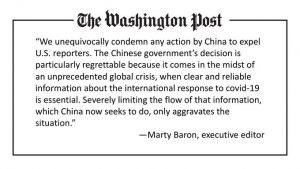March 17, 2020

Seattle Times
From the editor: As we face the coronavirus challenge together, thank you for your support
While the region mobilizes to respond to the spread of COVID-19, I want to take a moment to thank you for your support. So many of you have reached out to me and our news staff with your tips, questions and gratitude for our coronavirus coverage. We have been working hard to bring you the most current, factual information on this quickly evolving crisis.
It’s been two astonishing weeks — for all of you, and for all of us.
In my 35 years as a journalist, I can say I’ve never felt so keenly the importance of local journalism to our community. And in my 27 years at The Seattle Times, I’ve never seen the entire company rally behind our mission the way we are now.
We are working at a breakneck pace to report rapidly changing news developments such as closures, new cases and travel restrictions. We are asking tough questions to hold officials accountable, while also telling of the extreme challenges they face. We’re capturing moments of heart-wrenching struggle and uplifting acts of kindness.
And we are intently focused on providing you with the resources you need to navigate this unsettling time: things like tips for keeping your home virus-free, and this detailed graphic explaining how the virus takes hold and the steps you can take to stay safe.
Many of you have asked what we’re doing to safeguard the health of our staff and the public.
While we don’t pretend to have all the answers — no one does — we’re doing our best. For the first time ever, every newsroom employee is working remotely from home, as are all company employees who are able to do so.
For those who must go out to do their jobs, we are taking extra precautions.
We’ve told all Times employees, including our reporters, photographers and video journalists, to avoid areas where someone has tested positive for COVID-19, and we’ve shared public health guidelines such as keeping a distance of 6 feet or more from people whenever possible. We opted not to provide masks, after health officials advised against their use for healthy people. But we have provided hand sanitizer and have bought special protective gear for those who need it to report from inside hospitals or other high-risk places.
For our operations and circulation staff, as well as our carriers — who don’t have the option of working from home — we are taking every step we can to safeguard their health.
Our staff is fueled by your support. The kind notes, calls and social media messages we are receiving each day have kept us going at moments when we’ve felt exhausted, worried or discouraged.
We’re also heartened to see how many people are coming to us to stay informed. Readership of our website has been triple our normal volume — even 10 times the volume at key breaking-news moments. And despite the fact that we’ve made our coronavirus stories free as a public service, this coverage has drawn new subscribers at record levels.
That’s critical, especially given the fact that while the world feels changed, the economic challenges facing the news business remain the same. If you don’t already subscribe but want us to continue fulfilling the critical role of informing you, please consider joining us in this mission by subscribing. You can do so at seattletimes.com/subscribe or by calling 206-464-2121 or 800-542-0820.
As we head into uncertain times, here are some free useful resources to keep handy:
Additionally, if you have news tips, story ideas or feedback on any of our coverage, please email us at newstips@seattletimes.com.
For all of us, living in this new reality means adapting very suddenly to new routines. We’ve certainly felt that ourselves, and unlike with many big news stories we cover, we are experiencing this one right along with the people we’re writing about.
In fact, that’s one positive side effect of this pandemic: We’re becoming more empathetic by the day, and we see you doing the same.
I’d love to hear from you if you have thoughts or questions for me personally. Feel free to write me at michmflo@seattletimes.com.
On behalf of all of us at The Times, I share our deep appreciation for your continued support of us, and of local journalism.
~Michele Matassa Flores

FACT CHECKING
What is martial law? When will coronavirus tests be widely available? And other answers to your questions about government action on COVID-19
What is martial law? When will coronavirus tests be widely available? And other answers to your questions about government action on COVID-19
Evan Osnos, staff writer at New Yorker/Fellow at Brookings Institute
“With China kicking out American journalists, the world loses a crucial window on the drivers of global health and global economy. Whatever you think of American media, this is bad for finance, pandemics, education, and national security worldwide, including for Chinese citizens.”

Hong Kong Free Press
Beijing to oust US reporters from NYT, WashPo, Wall St Journal from China and bar them from journalism in Hong Kong
China is to strip US journalists from the New York Times, Wall Street Journal and Washington Post of their credentials.
The foreign ministry said on Thursday that the outlets – along with Voice of America and TIME Magazine – must submit documents detailing “staff members, financial status, operation status and property they owned in China.” Press cards which expire by the end of this year must then be returned within 10 days.
In a further unprecedented move, the ministry also said that the US staff from the New York Times, Wall Street Journal and Washington Post would not be allowed to work as journalists in Hong Kong or Macau.
Tit-for-tat action
The action comes after Washington cut by almost half the number of Chinese citizens allowed to work for Beijing’s state-run media in the US following the ousting of three Wall Street Journal reporters from China.
In its statement, the ministry said that China’s measures were “in response to the unreasonable oppression the Chinese media organizations experience in the US. They are legitimate and justified self-defense in every sense.”
Head of NGO Human Rights Watch Kenneth Roth said the move could also be related to the recent coronavirus outbreak: “Beijing is ostensibly responding to limits on the number of Chinese citizens who could work in the US for 5 Chinese state-run news organizations, but a big factor was undoubtedly reporting on China’s disastrous censoring of the Wuhan doctors who tried to warn of the coronavirus,” he said on Twitter.
Beijing to oust US reporters from NYT, WashPo, Wall St Journal from China and bar them from journalism in Hong Kong
#TRUTH
VOX
Zak Beauchamp:
“The US’s horrible response to coronavirus isn’t just a Trump thing. It’s a damning indictment of decades of right-wing attacks on academia and expertise.”
How the GOP’s decades-long war on expertise sabotaged America’s fight against the pandemic.
Modern American conservatism has, as part of its intellectual DNA, a disdain for the country’s intellectual elite. In 1961, National Review founder William F. Buckley famously said, “I would rather be governed by the first 2,000 people in the telephone directory than by the Harvard University faculty.”
Buckley, a New York-born patrician, was no one’s idea of a populist. Yet his assaults on academia helped give rise to a political movement that rejects the intellectual authority of America’s credentialed elite altogether, leading to a creation of alternative conservative institutions and hostility toward mainstream research programs (like, say, climate science). In the Trump era, this vision has linked up to Trump’s swamp-draining, deep-state-blaming political style to produce a form of right-wing populism that treats the very idea of nonpartisan expertise as deeply suspect.
The result is not only a White House that’s outsourcing response ideas to the president’s son-in-law’s brother’s father-in-law’s Facebook group, but a right-wing media infrastructure that has worked overtime to cover for the president and paint the coronavirus as some kind of liberal plot to unseat him. Poll data shows that ordinary Democrats are both more likely to worry about the coronavirus than ordinary Republicans and more likely to change their behavior in ways recommended by experts (e.g., more hand-washing).
A public health emergency is not the sort of thing that can be muddled through by guesswork and politicians’ gut instincts. The stakes are clear, the consequences of failure dire. It is just about the worst moment for an anti-intellectual strain of right-wing populism to run our government — and yet, here we are.
[…]
But what happens in policy areas when there aren’t any Friedman equivalents — intellectually serious defenders of the conservative position? The debate over climate change shows us the answer: The move is to simply deny the overwhelming evidence compiled by scientific luminaries, to dismiss climate science as a “hoax” or a “conspiracy.” The war on academia bleeds into a war on the very idea of expertise.
The roots of this modern conservative approach can be seen as early as Buckley’s 1961 comments about Harvard — the idea that liberal elites are conning you, that they’re less competent than an ordinary person. The modern conservative movement has been taken over by this cheap anti-elitism, a belief that people who study things professionally are not to be trusted unless they pass conservative political tests and are housed at institutions like the Heritage Foundation, Fox News, or Liberty University. The very idea of nonpartisan knowledge production is obliterated (a move ironically reminiscent of an undergraduate’s shallow read of Foucault).
“We will never have the elite smart people on our side,” as former US Senator Rick Santorum put it in a 2012 speech, “because they believe they should have the power to tell you what to do.”





Leave a Reply